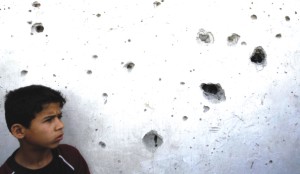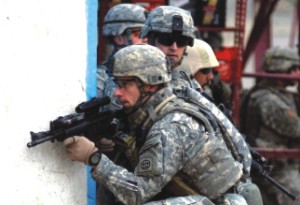|
Environment
The Spoils of War
Obaidur Rahman
 Anybody who has a shred of humility surely is unable to justify any war, as it leads to nothing but death and destruction of lives and civilisations and jeopardises all the morality and values that differentiates mankind from other species. But unfortunately we have often witnessed the ravages of armed conflicts that not only brought ruinous impact on the people but also had detrimental effects on the conflict zone's environment. Anybody who has a shred of humility surely is unable to justify any war, as it leads to nothing but death and destruction of lives and civilisations and jeopardises all the morality and values that differentiates mankind from other species. But unfortunately we have often witnessed the ravages of armed conflicts that not only brought ruinous impact on the people but also had detrimental effects on the conflict zone's environment.
It is fairly understandable that people become the centre of attention when armed conflicts break out and it's sincerely how it should be but as the environmental status and the state of human lives are interdependent, the synchronized efforts towards betterment of the both require great priority. Otherwise deterioration of one always leads to the worsening of the other as it is often we hear that due to some armed conflict people are forced to take refuge in aid camps however they continue to endure severe humanitarian crisis as they are compromised into a worsening environment. The environmental repercussions of military conflicts are nothing new and have been going on for ages and it is in fact intentionally practiced as a war-winning strategy and punishing the enemies. The ethical query is, who is the enemy here, since we all are a part of the environment?
Back in 146 BC, Romans would routinely destroy the crops and salty the lands of their enemies to ensure their future dependence on Rome, the systematic near extinction of America's once vast herds of Buffalo was nothing but a premeditated assault against Indian tribes whose survival was greatly dependent on them and Russians twice destroyed their own crops and designed the “Scorched Earth” policy to prevent those resources from being useful to Napoleon and later Hitler. Serb forces besieging Sarajevo deliberately contaminated water supplies to ensure that the innocent Bosnians lining up at lone wells for water are easy targets for Serb snipers. The constant blockade and military intrusion by the Israeli army has brought Gaza into the brink of an environmental and humanitarian disaster. The list goes on and with the passage of time the extension of devastation kept on escalating with much more severe and long-term consequences, all thanks to the modern day warfare and its brutally advanced tactics. The 1992 Rio Declaration states that, “Warfare is inherently destructive of sustainable development. States shall therefore respect international law providing protection for the environment in times of armed conflict and cooperate in its further development, as necessary.” But history tells us laws are yet to protect the environment from the dire consequences of preparations, immediate effects and the aftermaths of wars.
From the destruction of thousands of acres of agricultural and forest land due to intense trench fighting of the WW-I to the utter destruction of Hiroshima and Nagasaki in WW-II, mankind has unfortunately worked out nifty ways of blowing up chunks of Earth one at a time. One of the infamous examples of modern-day military disregard for environment would be US military's indiscriminate use of Agent Orange, a toxic herbicide, which was sprayed in millions of litres over approximately 10% of Vietnam between 1962 and 1971. The initial motive was to defoliate tropical forests to expose enemy combatants, and destroy crops to deprive peasants of their food supply however the spraying destroyed 14% of South Vietnam's forests, including 50% of the mangrove forests along with an array of health problems in Vietnam including birth defects, spontaneous abortions, skin and lung cancers, lower IQ and emotional problems for children that still are in effect today. Two decades of civil conflicts destroyed 35% of the Cambodia's forestry. In 1992 when Soviet troops withdrew from former East Germany, 1.5 million tonnes of ammunition was destroyed and most of these ammunition was burned, without filters, in the open air and as a result nitrogen oxide, a highly toxic chemical dioxide and heavy metals like mercury were released into the atmosphere.
During the first Gulf War, the then retreating Iraqi forces sabotaged around 600 Kuwaiti oil wells which burned up to nine months creating a toxic black shroud composed of ejected smoke particles, toxic gases and chemicals, heavy metals which eventually fell out as acid rain over the region and beyond. Further impacts included fall of temperatures, collapse of Gulf fisheries, disruption of water supplies due to massive oil slicks and fires extending human suffering long after the end of a war in which more than 100,000 people died.
The US led invasion of Iraq in 2003 also created some serious environmental disasters for Iraq with the formers' massive use of modern ordnance which are composed of numerous toxic materials, plastic binders, heavy metals and rocket fuels and their indiscriminate use on supposed Iraqi nuclear facilities, various weapons production and storage sites, including those for chemical weapons and the destruction of industrial production facilities, water and sanitation and infrastructures.
 But experts are really concerned about the US military's application of Depleted Uranium (DU) in weaponries that could leave significant radiological hot spots across Iraq. DU, which is used to make tank armour and anti-tank missiles because of its high density and melting point ability, has a half-life of 4.5 billion years and it is extremely dense, 1.7 times as dense as lead. The poisonous and radioactive uranium is most dangerous when inhaled into the body where it will release radiation during the life of the person who inhaled it. And DU is just one of many modern weaponries that rely on toxic chemicals to strengthen their explosive force and propulsion that creates negative environmental impacts through their own composition as well as their destructive power. Every time a heavy bomb goes off it creates temperatures of approximately 3000 degrees Celsius. And this not only annihilates all flora and fauna but also destroys the lower layers of soil, which can take anywhere from 1,500 to 7,400 years to regenerate. But experts are really concerned about the US military's application of Depleted Uranium (DU) in weaponries that could leave significant radiological hot spots across Iraq. DU, which is used to make tank armour and anti-tank missiles because of its high density and melting point ability, has a half-life of 4.5 billion years and it is extremely dense, 1.7 times as dense as lead. The poisonous and radioactive uranium is most dangerous when inhaled into the body where it will release radiation during the life of the person who inhaled it. And DU is just one of many modern weaponries that rely on toxic chemicals to strengthen their explosive force and propulsion that creates negative environmental impacts through their own composition as well as their destructive power. Every time a heavy bomb goes off it creates temperatures of approximately 3000 degrees Celsius. And this not only annihilates all flora and fauna but also destroys the lower layers of soil, which can take anywhere from 1,500 to 7,400 years to regenerate.
Besides experts also believe that this Iraq war has spelled the end for the Mesopotamian marshes on the lower reaches of the Tigris and Euphrates rivers, now two of the most polluted water bodies of Iraq, once Iraq's most prized environmental assets. The situation in Afghanistan is much worse as one BBC report says that according to UN two decades of war have caused so much damage to Afghanistan's environment that its reconstruction is now compromised. Years of conflicts instigated by foreign forces has turned Afghanistan into a country prone to drought with constant degradation of its natural resources which includes lowered water tables, dried-up wetlands, denuded forests, eroded land and endangered wildlife populations.
Environment is also affected by the indirect impacts made through the diversion of resources from ecological protection to military spending, and through the pollution caused by arms production. Establishment of military bases often led to the destruction of flora and fauna since they require large areas of land of ecological value. Large sectors of land are often reserved for military exercises like tank manoeuvres, tactical missile exercise, bombing exercise, artillery practices to even for deadly chemical and biological warfare exercises all which could have been used for forestry, agricultural or other economic purposes. According to the UNESCO, in 1971 the world spent 7.2% of its gross national product on arms compared to 5% on education and 2.5% on health care. Two days of global military spending of approx, $4.8 billion is equal to the annual cost of the UN Action Plan to halt Third World desertification over 20 years. In the 1980s the Ethiopian government spent an annual average of $275 million on waging war in Eritrea and Tigre. But only an expenditure of $50 million a year on tree plantation and soil conservation could have reversed the desertification of the country and prevented the deaths of millions in the 1985 famine. This sadly indicates that the rampage of war machines not only disrupts the state of environment and society but also contributes largely to the economic struggle of the world that kept many nations under the dark shades of poverty.
The long legacy of environmental destruction caused by warfare prompted United Nation to declare November 6 of each year as the International Day for Preventing the Exploitation of the Environment in War and Armed Conflict. Despite laws, protocols, and conventions it seems application of moral values is urgency of now to hold wartime aggressors accountable for ecological crimes and end the ongoing military conflicts. Otherwise the extent of environmental problems will only escalate with fatal deterioration of the human living conditions as John F. Kennedy once said, “Mankind must put an end to war, or war will put an end to mankind”.
Copyright (R) thedailystar.net 2008 |
